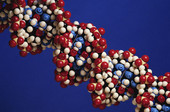
WEDNESDAY, March 9 (HealthDay News) — Some genetic tests sold directly to consumers that might help to predict health risks may need to be supplied through doctors, a U.S. Food and Drug Administration official said Wednesday, Bloomberg News reported.
The official, Alberto Gutierrez, director of the FDA office that regulates diagnostic screening tools, made the comments to reporters after an agency advisory panel concluded two days of hearings on the increasingly popular tests. The hearings were held to weigh the tests’ benefits and risks.
“We’re probably not going to be able to take one approach to all the types of tests that the companies want to offer,” Gutierrez said, noting that the agency will likely make determinations to restrict the use of the tests on a case-by-case basis, Bloomberg reported. “It depends on the disease and the type of test.”
The FDA may require that some genetic tests be ordered by doctors, and some test results may have to be sent to doctors instead of patients, he said. Other tests “may not require a doctor at all,” he said.
The tests, their manufacturers contend, can help predict a person’s risk for disease or how someone might respond to a given medication.
The advisory panel looked only at those genetic tests sold directly to consumers without the involvement of medical professionals. The kits enable people to have their genetic material analyzed to identify variations that might be related to inherited disorders, such as cystic fibrosis, breast cancer and even Alzheimer’s disease.
This relatively new category of tests sprang up as a result of the U.S. Human Genome Project, begun in 1990, which boosted understanding of human health, disease and genetics, the FDA explained in a background summary. Because the field is so new, little is known about the accuracy of home genetic tests or the implications of test results, particularly if a health-care professional is not involved to help consumers interpret the results.
Currently, only home tests that make medical claims are regulated by the agency.
Last year, Pathway Genomics announced that it would start selling tests (in general, the test can cost from $400 to $2,000) at Walgreens stores, which are ubiquitous in the United States. Walgreens reversed its decision, however, after the FDA raised questions about the supplier.
Before drafting regulations for the direct-to-consumer tests, the FDA had asked its advisers and test manufacturers for input in a variety of areas, including the reliability of the tests; the possibilities for misuse; the likelihood — and consequences — of misunderstood results; and how a lack of counseling might affect people who receive disturbing results.
For the tests, consumers can take a sample of their saliva or blood, for example, and send it to a clinical laboratory for analysis without guidance or oversight from a medical professional. Patients must initiate any medical follow-up or counseling on their own.
Because people might make medical decisions based on the test results, the FDA will probably set standards to minimize the chance of misuse or misinterpretation of test results, similar to standards governing prescription-only genetic tests or home tests such as pregnancy tests.
Other considerations will include how to categorize the different types of home genetic tests. Three possibilities, the FDA said, include: tests that screen for carriers of a disorder that can be inherited; tests that predict risk for a disorder, such as ovarian cancer, in people with no symptoms; and tests claiming to predict how someone will respond to a particular drug or medical treatment.
Test makers defend their products, but test accuracy is a key concern of skeptical medical professionals. A recent undercover study of 15 direct-to-consumer genetic tests by the U.S. Government Accountability Office found “egregious examples of deceptive marketing, in addition to poor or nonexistent advice from supposed consultation experts,” according to a report published in The Lancet.
Whether the test results are clinically valid or useful is also a concern. Dr. Bruce R. Korf, president of the American College of Medical Genetics, recently told HealthDay that inaccurate results could create a sense of “false reassurance.”
Someone who learns he or she is at reduced risk for type 2 diabetes, for example, might figure they don’t need to worry about weight or diet, said Korf, who is also chairman of genetics at the University of Alabama at Birmingham. “The [test] may not give you the whole story and may not even be true for [that patient],” he said.
Fears that test results might be emotionally devastating were not borne out by a recent study led by Dr. Eric Topol, director of the Scripps Translational Science Institute in La Jolla, Calif.
“There have been proclamations that this would induce a tremendous amount of fear and trauma for people and speculation as to whether it would help at all,” Topol said. But his study, published in January in the New England Journal of Medicine, found that consumers don’t suffer great anxiety in the face of negative results, nor do they change their lifestyle habits in response to test results.
More information
The U.S. National Human Genome Research Institute has more about genetics and disease.

